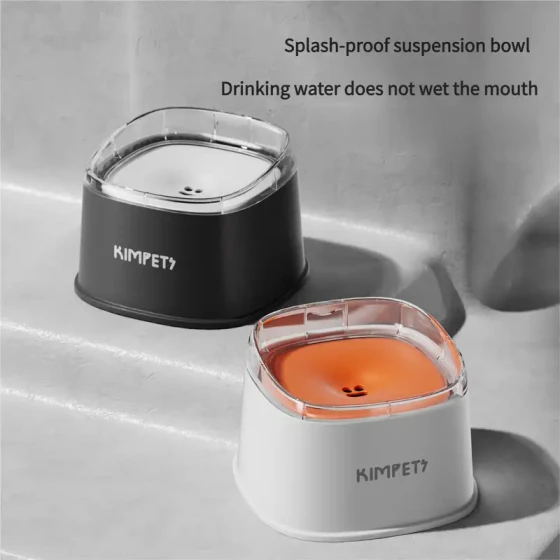Cat Breathing Sound Rumbling_These Abnormal Causes Should Be Alerted
When you hear your cat's breathing making a "rumbling" abnormal noise, this is often not a normal phenomenon and requires caution. Although a healthy cat makes a similar low vibrating sound when purring, which is a sign of contentment or relaxation, if this "rumbling" sound is accompanied by labored breathing, abnormal frequency, or even open-mouth breathing, it likely indicates underlying health issues. You should promptly take your cat to a veterinarian to identify the specific cause and receive professional treatment.
Normal cat breathing is usually quiet, smooth, and effortless. You might occasionally hear light breathing sounds, but in most cases, a healthy cat does not make obvious noises while breathing. When you notice "rumbling" or other abnormal breathing sounds, it generally indicates airflow obstruction or turbulence in the airways, possibly caused by inflammation, secretions, foreign bodies, or more severe diseases.
Understanding the possible causes of abnormal cat breathing sounds helps you better observe and describe your cat's symptoms to the vet, aiding a quicker diagnosis.
Normal vs. Abnormal: How to distinguish between a cat's purr and abnormal breathing sounds?
A cat's purr is a special physiological phenomenon, usually produced when they feel comfortable, relaxed, and satisfied, or sometimes to self-soothe when injured or in pain. This sound results from continuous low-frequency vibrations caused by movements of the vocal cords and diaphragm muscles. You can hear it and sometimes even feel the vibrations in the cat's chest or throat. Purring is typically regular and gentle.
Abnormal "rumbling" breathing sounds are different. They may sound like nasal congestion, phlegm in the throat, lung noises, or wheezing caused by airway narrowing. This sound often accompanies other signs of breathing difficulty, such as:
- Breathing rate that is too fast or too slow.
- Increased breathing effort, with obvious chest or abdominal movement.
- Open-mouth breathing (cats usually do not breathe with their mouths open unless after intense exercise or extreme heat).
- Neck extension to facilitate breathing.
- Nostril flaring.
- Coughing or sneezing.
- Lack of appetite or lethargy.
- Purplish tongue or gums (an emergency sign of hypoxia!).
If you are unsure whether the sound you hear is purring or abnormal breathing, observing the cat's overall mental state and the presence of the above symptoms is key. If the cat appears uncomfortable or shows other symptoms, even if it sounds like a "rumbling," you should seek veterinary care immediately.
Possible abnormal causes of cat breathing rumbling
There are many causes of abnormal cat breathing sounds, ranging from relatively minor issues to life-threatening emergencies. Some common possibilities include:
-
Upper respiratory tract problems:
- Nasal or sinus obstruction: Cold, feline viral rhinotracheitis, rhinitis, nasal polyps, or nasal tumors can lead to increased nasal secretions and mucosal swelling, causing air to make "rumbling" or snoring-like sounds through the nasal passages, similar to human nasal congestion.
- Throat or tracheal issues: Laryngitis, tracheitis, tracheal stenosis, laryngeal edema, or foreign bodies can affect airflow into and out of the lungs, producing abnormal sounds.
-
Lower respiratory tract problems:
- Feline asthma: A common chronic respiratory disease similar to human asthma. When cats contact allergens (pollen, dust, smoke, perfume, etc.), the airways inflame and spasm, narrowing the airway. Breathing may produce wheezing, whistle-like sounds, sometimes "rumbling" or coughing.
- Bronchitis: Bronchial inflammation possibly caused by infection or irritation, increasing airway secretions and causing noise as air passes.
- Pneumonia: Lung infection causes inflammation and fluid buildup, seriously affecting gas exchange, making breathing sounds heavy with possible moist rales (bubble breaking sounds), sometimes sounding like "rumbling."
-
Cardiovascular issues:
- Cardiomyopathy or other heart diseases: Heart failure causes poor blood circulation, with fluid possibly accumulating in the lungs (pulmonary edema) or chest cavity (pleural effusion), severely affecting breathing. Pulmonary edema causes rapid, difficult breathing with wet rales or "rumbling" sounds.
-
Chest cavity problems:
- Pleural effusion: Abnormal fluid accumulates in the chest, like pleural fluid, pus, or blood, pressing on lungs and causing difficulty breathing and abnormal sounds.
- Pneumothorax: Air in the chest cavity causing lung collapse.
- Diaphragmatic hernia: Rupture of the diaphragm allows abdominal organs to enter the chest cavity, compressing the lungs.
-
Other causes:
- Obesity: Excess weight increases respiratory burden, making breathing difficulties more likely, especially during exercise or stress.
- Foreign bodies: Small foreign objects inhaled (such as grass seeds, small bones) may lodge in airways, causing irritation, coughing, and abnormal breathing sounds.
- Tumors: Tumors in the respiratory tract or chest cavity may compress airways, affecting breathing.
When should you take your cat to the vet immediately?
As emphasized at the beginning, any abnormal breathing sound, especially with the following symptoms, should be considered an emergency requiring immediate veterinary care:
- Very labored, rapid, or slow breathing.
- Open-mouth breathing.
- Purplish tongue or gums.
- Obvious wheezing or coughing.
- Lethargy, lack of appetite.
- Reluctance to move.
Even if the cat appears mentally okay but continues to have abnormal breathing sounds, consulting a vet as soon as possible is recommended. Early diagnosis and treatment are crucial for many respiratory diseases.
How do veterinarians diagnose and treat?
Vets first conduct a detailed history and a comprehensive physical examination, including auscultating the cat’s heart and lungs. Based on initial findings, vet may recommend further diagnostic tests, such as:
- Chest X-rays: Assess lungs, heart, and chest cavity for pneumonia, pulmonary edema, pleural effusion, pneumothorax, tumors, or foreign bodies.
- Complete blood count and biochemical tests: Evaluate overall health, detect infections or systemic diseases.
- Feline infectious disease screening: Tests for viral rhinotracheitis, FIV, FeLV, which may cause or worsen respiratory problems.
- Tracheoscopy or bronchoscopy: Direct visualization of airway interiors, collection of secretions or tissue for diagnosis of foreign bodies, tumors, or chronic inflammation.
- Cardiac ultrasound: Evaluate heart structure and function to diagnose cardiac diseases.
- Thoracocentesis: If pleural effusion is present, fluid is withdrawn for analysis to determine cause.
Treatment depends entirely on the specific cause of abnormal breathing sounds. Treatment options may include:
- Medications: Antibiotics for bacterial infections causing pneumonia or rhinitis; antivirals if applicable; bronchodilators or corticosteroids for asthma or inflammation; diuretics for pulmonary edema, etc.
- Oxygen therapy: For cats with severe breathing difficulty, oxygen supplements help relieve hypoxia.
- Nebulized therapy: Inhaling aerosolized medication targets airways directly, commonly used for asthma and bronchitis.
- Surgery: Removal of foreign bodies, nasal polyps, or tumors if necessary.
- Supportive care: Maintaining a comfortable environment, providing nutritional support, etc.
Daily management and prevention
Although not all respiratory problems can be prevented, certain daily care measures help lower risks or ease symptoms:
- Avoid irritants: Avoid using perfume, air fresheners, smoke, strong-smelling cleaners, or cat litters at home, as these can irritate a cat’s airways and worsen asthma symptoms.
- Keep the environment clean: Regularly clean the cat’s living area to reduce dust and allergens.
- Control weight: Maintain a healthy body weight to reduce respiratory burden.
- Regular check-ups: Take your cat for routine health exams to detect issues early.
- Timely vaccinations: Prevent infectious diseases like feline viral rhinotracheitis.
Frequently Asked Questions
- Q: How to tell the difference between a cat’s purr and abnormal "rumbling" sound when sick?
- A: Healthy purring is regular and gentle, with the cat appearing relaxed and comfortable. The "rumbling" sound when sick often comes with labored or rapid breathing and other discomfort signs; the sound may be heavier or similar to blockage.
- Q: Is a cat’s "rumbling" breathing sound always a serious disease?
- A: Not necessarily; sometimes it might be temporary nasal congestion. But since it can signal various serious diseases including life-threatening pulmonary edema or severe asthma, do not take it lightly—getting a vet’s diagnosis promptly is wise.
- Q: Can I medicate my cat by myself?
- A: Absolutely not. Cats’ respiratory systems are very delicate, and many human drugs are toxic to cats. Always follow a vet’s guidance, do not self-diagnose or use human medicine.
- Q: If the cat occasionally makes a "rumbling" noise but seems normal in appetite and spirit, do I need to visit a hospital immediately?
- A: If very occasional and no other symptoms, you can watch initially. But if the sounds persist, increase in frequency, or you have concerns, schedule a vet examination to rule out risks.
Summary
The "rumbling" abnormal sound in a cat’s breathing is a warning signal not to be ignored. While causes vary widely, some require urgent intervention. Responsible pet owners closely monitor their cat’s respiratory status and seek prompt veterinary help when abnormalities arise—this is key to ensuring the cat’s health and safety. Remember, never attempt to diagnose or treat breathing problems at home yourself.
References
- Based on information about feline asthma from the Cat Fanciers' Association (CFA) and International Society of Feline Medicine (ISFM).
- Based on Cornell University College of Veterinary Medicine’s introduction to feline upper respiratory infections.
- Based on veterinarian health websites (such as VCA Animal Hospitals, PetMD) articles about feline respiratory distress and related diseases (pneumonia, pleural effusion).
- Based on information from veterinary cardiology experts about feline cardiomyopathy and pulmonary edema.



